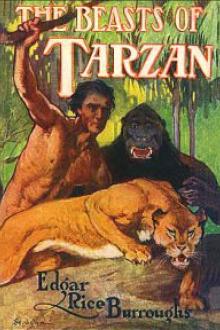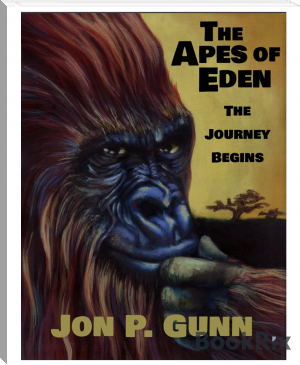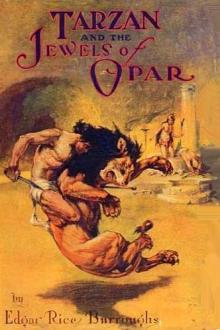Beasts of Tarzan by Edgar Rice Burroughs (best thriller books to read .txt) 📕

- Author: Edgar Rice Burroughs
- Performer: 0809599848
Book online «Beasts of Tarzan by Edgar Rice Burroughs (best thriller books to read .txt) 📕». Author Edgar Rice Burroughs
Sheeta’s cruel fangs and tearing talons ripped and tore at the black hides. Akut’s mighty yellow tusks found the jugular of more than one sleek-skinned savage, and Tarzan of the Apes was here and there and everywhere, urging on his fierce allies and taking a heavy toll with his long, slim knife.
In a moment the blacks had scattered for their lives, but of the score that had crept down the grassy sides of the promontory only a single warrior managed to escape the horde that had overwhelmed his people.
This one was Mugambi, chief of the Wagambi of Ugambi, and as he disappeared in the tangled luxuriousness of the rank growth upon the ridge’s summit only the keen eyes of the ape-man saw the direction of his flight.
Leaving his pack to eat their fill upon the flesh of their victims—flesh that he could not touch—Tarzan of the Apes pursued the single survivor of the bloody fray. Just beyond the ridge he came within sight of the fleeing black, making with headlong leaps for a long war-canoe that was drawn well up upon the beach above the high tide surf.
Noiseless as the fellow’s shadow, the ape-man raced after the terror-stricken black. In the white man’s mind was a new plan, awakened by sight of the war-canoe. If these men had come to his island from another, or from the mainland, why not utilize their craft to make his way to the country from which they had come? Evidently it was an inhabited country, and no doubt had occasional intercourse with the mainland, if it were not itself upon the continent of Africa.
A heavy hand fell upon the shoulder of the escaping Mugambi before he was aware that he was being pursued, and as he turned to do battle with his assailant giant fingers closed about his wrists and he was hurled to earth with a giant astride him before he could strike a blow in his own defence.
In the language of the West Coast, Tarzan spoke to the prostrate man beneath him.
“Who are you?” he asked.
“Mugambi, chief of the Wagambi,” replied the black.
“I will spare your life,” said Tarzan, “if you will promise to help me to leave this island. What do you answer?”
“I will help you,” replied Mugambi. “But now that you have killed all my warriors, I do not know that even I can leave your country, for there will be none to wield the paddles, and without paddlers we cannot cross the water.”
Tarzan rose and allowed his prisoner to come to his feet. The fellow was a magnificent specimen of manhood—a black counterpart in physique of the splendid white man whom he faced.
“Come!” said the ape-man, and started back in the direction from which they could hear the snarling and growling of the feasting pack. Mugambi drew back.
“They will kill us,” he said.
“I think not,” replied Tarzan. “They are mine.”
Still the black hesitated, fearful of the consequences of approaching the terrible creatures that were dining upon the bodies of his warriors; but Tarzan forced him to accompany him, and presently the two emerged from the jungle in full view of the grisly spectacle upon the beach. At sight of the men the beasts looked up with menacing growls, but Tarzan strode in among them, dragging the trembling Wagambi with him.
As he had taught the apes to accept Sheeta, so he taught them to adopt Mugambi as well, and much more easily; but Sheeta seemed quite unable to understand that though he had been called upon to devour Mugambi’s warriors he was not to be allowed to proceed after the same fashion with Mugambi. However, being well filled, he contented himself with walking round the terror-stricken savage, emitting low, menacing growls the while he kept his flaming, baleful eyes riveted upon the black.
Mugambi, on his part, clung closely to Tarzan, so that the ape-man could scarce control his laughter at the pitiable condition to which the chief’s fear had reduced him; but at length the white took the great cat by the scruff of the neck and, dragging it quite close to the Wagambi, slapped it sharply upon the nose each time that it growled at the stranger.
At the sight of the thing—a man mauling with his bare hands one of the most relentless and fierce of the jungle carnivora—Mugambi’s eyes bulged from their sockets, and from entertaining a sullen respect for the giant white man who had made him prisoner, the black felt an almost worshipping awe of Tarzan.
The education of Sheeta progressed so well that in a short time Mugambi ceased to be the object of his hungry attention, and the black felt a degree more of safety in his society.
To say that Mugambi was entirely happy or at ease in his new environment would not be to adhere strictly to the truth. His eyes were constantly rolling apprehensively from side to side as now one and now another of the fierce pack chanced to wander near him, so that for the most of the time it was principally the whites that showed.
Together Tarzan and Mugambi, with Sheeta and Akut, lay in wait at the ford for a deer, and when at a word from the ape-man the four of them leaped out upon the affrighted animal the black was sure that the poor creature died of fright before ever one of the great beasts touched it.
Mugambi built a fire and cooked his portion of the kill; but Tarzan, Sheeta, and Akut tore theirs, raw, with their sharp teeth, growling among themselves when one ventured to encroach upon the share of another.
It was not, after all, strange that the white man’s ways should have been so much more nearly related to those of the beasts than were the savage blacks. We are, all of us, creatures of habit, and when the seeming necessity for schooling ourselves in new ways ceases to exist, we fall naturally and easily into the manners and customs which long usage has implanted ineradicably within us.
Mugambi from childhood had eaten no meat until it had been cooked, while Tarzan, on the other hand, had never tasted cooked food of any sort until he had grown almost to manhood, and only within the past three or four years had he eaten cooked meat. Not only did the habit of a lifetime prompt him to eat it raw, but the craving of his palate as well; for to him cooked flesh was spoiled flesh when compared with the rich and juicy meat of a fresh, hot kill.
That he could, with relish, eat raw meat that had been buried by himself weeks before, and enjoy small rodents and disgusting grubs, seems to us who have been always “civilized” a revolting fact; but had we learned in childhood to eat these things, and had we seen all those about us eat them, they would seem no more sickening to us now than do many of our greatest dainties, at which a savage African cannibal would look with repugnance and turn up his nose.
For instance, there is a tribe in the vicinity of Lake Rudolph that will eat no sheep or cattle, though its next neighbors do so. Near by is another tribe that eats donkey-meat—a custom most revolting to the surrounding tribes that do not eat donkey. So who may say that it is nice to eat snails and frogs’ legs and oysters, but disgusting to feed upon grubs and beetles, or that a raw oyster, hoof, horns, and tail, is less revolting than the sweet, clean meat of a fresh-killed buck?
The next few days Tarzan devoted to the weaving of a barkcloth sail with which to equip the canoe, for he despaired of being able to teach the apes to wield the paddles, though he did manage to get several of them to embark in the frail craft which he and Mugambi paddled about inside the reef where the water was quite smooth.
During these trips he had placed paddles in their hands, when they attempted to imitate the movements of him and Mugambi, but so difficult is it for them long to concentrate upon a thing that he soon saw that it would require weeks of patient training before they would be able to make any effective use of these new implements, if, in fact, they should ever do so.
There was one exception, however, and he was Akut. Almost from the first he showed an interest in this new sport that revealed a much higher plane of intelligence than that attained by any of his tribe. He seemed to grasp the purpose of the paddles, and when Tarzan saw that this was so he took much pains to explain in the meagre language of the anthropoid how they might be used to the best advantage.
From Mugambi Tarzan learned that the mainland lay but a short distance from the island. It seemed that the Wagambi warriors had ventured too far out in their frail craft, and when caught by a heavy tide and a high wind from off-shore they had been driven out of sight of land. After paddling for a whole night, thinking that they were headed for home, they had seen this land at sunrise, and, still taking it for the mainland, had hailed it with joy, nor had Mugambi been aware that it was an island until Tarzan had told him that this was the fact.
The Wagambi chief was quite dubious as to the sail, for he had never seen such a contrivance used. His country lay far up the broad Ugambi River, and this was the first occasion that any of his people had found their way to the ocean.
Tarzan, however, was confident that with a good west wind he could navigate the little craft to the mainland. At any rate, he decided, it would be preferable to perish on the way than to remain indefinitely upon this evidently uncharted island to which no ships might ever be expected to come.
And so it was that when the first fair wind rose he embarked upon his cruise, and with him he took as strange and fearsome a crew as ever sailed under a savage master.
Mugambi and Akut went with him, and Sheeta, the panther, and a dozen great males of the tribe of Akut.
The war-canoe with its savage load moved slowly toward the break in the reef through which it must pass to gain the open sea. Tarzan, Mugambi, and Akut wielded the paddles, for the shore kept the west wind from the little sail.
Sheeta crouched in the bow at the ape-man’s feet, for it had seemed best to Tarzan always to keep the wicked beast as far from the other members of the party as possible, since it would require little or no provocation to send him at the throat of any than the white man, whom he evidently now looked upon as his master.
In the stern was Mugambi, and just in front of him squatted Akut, while between Akut and Tarzan the twelve hairy apes sat upon their haunches, blinking dubiously this way and that, and now and then turning their eyes longingly back toward shore.
All went well until the canoe had passed beyond the reef. Here the breeze struck the sail, sending the rude craft lunging among the waves that ran higher and higher as they drew away from the shore.
With the tossing of the boat the apes became panic-stricken. They first moved uneasily about, and then commenced grumbling and whining. With difficulty Akut kept them in hand for a time; but when a particularly large wave struck the dugout simultaneously with a little squall of wind their terror broke all





Comments (0)